Research Fellow
A Research Fellow is a NIH employee who possesses a doctoral degree and is on a time-limited, renewable appointment. The purpose of the Research Fellowship is to provide junior-level scientists experience in biomedical research while they provide a service relevant to the Institute or Center’s (IC) program needs. The Research Fellow will spend the entire fellowship in laboratory research, while supporting the performance of NIH intramural research. Scientists with considerable experience beyond postdoctoral training may be designated Senior Research Fellows .
To be eligible for a Research Fellowship, a candidate must have demonstrated outstanding scholastic achievement and the ability to conduct successfully, with minimal supervision, a pre-established program in laboratory research.
Because Research Fellows perform services for NIH in addition to the training experience, these positions apply against the IC’s Full-Time Equivalent Employment (FTE) ceiling.
A Research Fellow is a U.S. citizen, U.S. permanent resident (green card, resident alien), or non-resident alien with a valid employment-authorized visa foreign national, who has been appointed to conduct health-related research at a NIH facility. Research Fellow (Visiting Program [VP]) appointments may be renewed; however, the total length of an appointment may not exceed the 5/8 Year Duration Policy . For foreign nationals on a visa, all renewals are subject to applicable visa restrictions.
As part of an effort to attract and retain top-level Research Fellow and Research Fellow (VP) candidates for a variety of different scientific disciplines, the NIH established the following programs:
- Early Independent Scientist : an intramural component of the national NIH Director’s Early Independent Scientist (EIS) Program designed to support recent doctoral graduates in independent positions without the need to train further in a post-doctoral fellowship.
- Independent Research Scholar (IRS) : a new program launched in 2019 focused to build the workforce diversity of independent research scientists.
Both Research Fellows and Research Fellows (VP) are Full-Time Equivalent Employment (FTE) positions.

Approvals (Process)
Research Fellows are appointed using Title 42(g) and approved by the delegated authority in each IC. Research Fellow appointments are traditionally approved by the Scientific Director (SD) for an initial 2-3 year period, but may be made for a shorter period (no less than 3 months). Depending on salary level and other pay components proposed, review and approval may be required from both the IC Title 42 Standing Committee and the NIH Compensation Committee (NCC). Please consult the Title 42 Pay Model for additional information.
For Research Fellows that require clinical credentialing, an additional approval must be received from the Director, CC (or delegate) after recommendation by the Clinical Center (CC) Credentials Committee and the Medical Executive Committee (MEC). For further information, please contact the Office of Credentialing Services, Clinical Center (OCS/CC) at [email protected] or 301-496-5937.
Additional approvals and requirements for Visiting Program fellows can be found at the Division of International Services .
Check Sheets / Checklists
There is currently no Deputy Director for Intramural Research (DDIR) -approved check sheet or checklist for the Research Fellow designation. Individual ICs may have additional requirements and check sheets. Please contact your Administrative Officer (AO) or HR Specialist for additional guidance.
Intramural scientists at the NIH, as is true for all scientists, should be committed to the responsible use of scientific tools and methods to seek new knowledge. While the general principles of scientific methodologies are universal, their detailed application may differ in various scientific disciplines and circumstances. All research staff in the Intramural Research Program should maintain exemplary standards of intellectual honesty in formulating, conducting, presenting, and reviewing research, as befits the leadership role of the NIH.
Within the NIH IRP, the ethical conduct of researchers is governed by the following three disciplines:
- Research Ethics
- Government Ethics
Ethics information may also be available through your specific IC. Please contact your Ethics Counselor for additional guidance.
Pay / Compensation
Pay and compensation for Title 42(g) appointed Research Fellows is based on the Title 42 Pay Model . Research Fellow salary ranges are in Band I. Depending on salary level and other pay components proposed, review and approval may be required from both the IC Title 42 Standing Committee and the NIH Compensation Committee (NCC).
For additional pay and compensation information for Research Fellow (VP) appointments, according to their specific visa requirements, please contact the Division of International Services (DIS) .
Recruitment Process / Appointment Mechanisms
Recruitment of a Research Fellow is made via Title 42(g) .
Sufficient outreach efforts must be taken to assure that a diverse pool of potential candidates (e.g. minorities, women, and individuals with disabilities) is made aware of fellowship opportunities. At a minimum, the candidate must possess a doctoral-level degree from an accredited institution of higher learning, including: Ph.D., M.D., D.V.M., D.D.S., D.M.D., Sc.D., or other research doctoral-degree widely recognized in U.S. academe as equivalent to a Ph.D.
Official position descriptions are not required. However, the supervisor must prepare a narrative statement fully describing the duties and responsibilities required.
Qualifications for a Research Fellow appointment include the following:
- Appointees must be U.S. citizens, U.S. permanent resident (green card, resident alien), or non-resident aliens with a valid employment-authorized visa.
- Candidates must possess a Ph.D., M.D., D.D.S., D.M.D., D.V.M. or equivalent degree in a biomedical, behavioral, or related science, or have been certified by a university as meeting all the requirements leading to such a doctorate.
- Candidates must furnish proof that they meet educational requirements. For most scientists, official transcripts are required. For very senior scientists with established professional reputations who are well known in their fields, a copy of the doctoral degree, and professional license if any, may be sufficient. However, if the diploma does not indicate the field in which the doctorate is awarded (e.g., indicates only Doctor of Philosophy), then copies of transcripts or listings of courses are required.
- Foreign educated scientists from certain countries (e.g., China) may be unable to provide official transcripts. In those rare cases, a copy of the diploma, with official English translation, if necessary, may be accepted. However, if the diploma does not indicate the field in which the doctorate is awarded (e.g., indicates only Doctor of Philosophy), then copies of transcripts or listings of courses, with official translation, are required.
- Foreign education must be evaluated by an accredited organization to ensure that it is comparable to education received in the United States. ICs may wish to consult with the Division of International Services, ORS, and with OIR for preliminary advice on the equivalency of foreign degrees with U.S. doctorates. Simply because a degree is identified as a doctorate does not mean it is equivalent.
- A minimum of two references is required from professionals in the field, attesting to the candidate’s scientific qualifications, credentials, and accomplishments. Additional references may be required depending upon Office of Intramural Research (OIR) policies and the Intramural Professional Designation (IPD) proposed.
In addition to the aforementioned process, the NIH has established two additional recruitment methods as part of an effort to attract and retain top-level candidates for a variety of different scientific disciplines:
- Early Independent Scientist : an intramural component of the national NIH Director’s Early Independent Scientist (EIS) Program designed to support recent doctoral graduates in independent positions without the need to train further in a post-doctoral fellowship. Successful candidates are provided the resources to establish an independent research program, including salary and benefits, support for lab personnel, lab space, supplies, and start-up equipment. For additional information, please visit the Early Independent Scientists page as part of the IRP Web site.
- Independent Research Scholar (IRS) : a new program launching in 2019 focused to build the workforce diversity of independent research scientists.
Research Fellow appointments are made via Title 42(g) and renewed in 1-year increments, according to the 5/8 Year Duration Policy . The maximum length of this fellowship is eight years, and the duration is determined by the length of time spent at NIH in all fellowship capacities, unless the scientist is approved for tenure-track or another staff NIH appointment. For foreign nationals on a visa, all renewals are subject to applicable visa restrictions.
A Research Fellow is not granted independent resources by their Institute, except for Early Independent Scientists.
Termination
Research Fellow appointments may be terminated before their expiration date for cause (e.g., personal or scientific misconduct), unsatisfactory performance, or administrative reasons, including but not limited to, programmatic changes and/or budgetary considerations. Terminations of a Research Fellow must follow the policies and processes appropriate to the Title 42(g) appointment mechanism.
This page was last updated on Thursday, July 13, 2023

The Experience
- Career Impact
- Inclusion and Belonging
- Global Opportunities
More about Kellogg
- History & Legacy
- Convocation Ceremony
Degree Programs
- Full-Time MBA
- Executive MBA
- Master in Management
- Evening & Weekend MBA
- Certificate Program for Undergraduates
- Which Program is Right for Me?
- Admissions Events
- Academic Calendars
Executive Education
- Online Programs
- Programs for Individuals
- Nonprofit Programs
- Programs for Groups
- The Kellogg Advantage
- Contact Executive Education
- Request a Brochure
- Find a Program
- Alumni Network
- Career Journeys
- Global Impact
- Student Stories
- Applying to Kellogg
Publications and blogs
- Kellogg Magazine
- Kellogg Insight
- See All News + Stories
Academics + Research
- Faculty Directory
- Research Centers
- Case Studies
- Faculty Teaching Awards
- Academic Departments
- Research + Books
- Faculty Recruiting
Academic expertise
- Data Analytics
- Family Business
- Leadership & Organizations
- Social Impact
- Entrepreneurship
- Evening + Weekend MBA
- Deferred Enrollment
- PhD / Doctoral
- Undergraduate Certificate
Additional resources
- Tuition + Financial Aid
- Log into my account portal
- Companies + Recruiters
Research Fellows
When you join kellogg as a research fellow, you become part of a community..
Every year, Kellogg offers a limited number of Research Fellow opportunities. These are full-time staff positions that last either 1 or 2 years during which the Fellows gain exposure to current academic research at Kellogg as well as hands-on experience assisting those projects. These are excellent opportunities for anyone who is considering applying to a PhD in a discipline related to business research.
The Fellows who are currently on staff have access to many resources for their professional and academic development. We organize panel discussions on topics such as PhD Admissions and PhD Life specifically for our pre-doctoral audience. We also offer training and advice on advanced computational techniques from the professional experts in our Research Support team. Research Fellows are encouraged to network with Kellogg's PhD students, join reading groups, and of course to take advantage of the rich array of research seminars and guest speakers that take place at Kellogg and Northwestern.
Kellogg is committed to creating and maintaining a diverse and inclusive environment. We invest in programs, partnerships, initiatives, and events that unleash the transformative power of diversity and inclusion in the Kellogg community. Thus, we encourage people from underrepresented groups and non-dominant backgrounds to apply their unique contributions to our fellowship program. We are a proud member of the Pathways to Research and Doctoral Careers (PREDOC) consortium.
Featured Alumni

Contact us about Kellogg Research Support
Sloan Research Fellowships
2024 fellows, 2024 sloan research fellows.
Congratulations to the Sloan Research Fellows of 2024. The following 126 early-career scholars represent the most promising scientific researchers working today. Their achievements and potential place them among the next generation of scientific leaders in the U.S. and Canada. Winners receive $75,000, which may be spent over a two-year term on any expense supportive of their research.
Kwabena Bediako, University of California, Berkeley
Juan-Pablo Correa-Baena, Georgia Institute of Technology
Yael David, Memorial Sloan-Kettering Cancer Center
Lisa Fredin, Lehigh University
Stephen D. Fried, Johns Hopkins University
Kandis Leslie Gilliard-AbdulAziz, University of California, Riverside
Stavroula K. Hatzios, Yale University
Abigail Knight, University of North Carolina, Chapel Hill
Chong Liu, The University of Chicago
Zhenfei Liu, Wayne State University
Jonathan Z. Long, Stanford University
Jarad A. Mason, Harvard University
Lea Nienhaus, Florida State University
Rodrigo Noriega, University of Utah
Zachariah A. Page, The University of Texas at Austin
Shahar Sukenik, University of California, Merced
Alexandra Velian, University of Washington
Vojtech Vlcek, University of California, Santa Barbara
Wenjing Wang, University of Michigan
Xiao Wang, Massachusetts Institute of Technology
Sidney M. Wilkerson-Hill, University of North Carolina, Chapel Hill
Xin Yan, Texas A&M University
Yang Yang, University of California, Santa Barbara
COMPUTER SCIENCE
Jacob D. Andreas, Massachusetts Institute of Technology
Nathan Beckmann, Carnegie Mellon University
Adam M. Belay, Massachusetts Institute of Technology
Aaron Bernstein, Rutgers, The State University of New Jersey
Katherine (Katie) L. Bouman, California Institute of Technology
Simon Shaolei Du, University of Washington
Daniel Genkin, Georgia Institute of Technology
Nika Haghtalab, University of California, Berkeley
Nan Jiang, University of Illinois, Urbana-Champaign
Chi Jin, Princeton University
Rene F. Kizilcec, Cornell University
Aleksandra Korolova, Princeton University
Courtney Y. Paquette, McGill University
Priyanka Raina, Stanford University
Arvind Satyanarayan, Massachusetts Institute of Technology
Adriana Schulz, University of Washington
Yakun Sophia Shao, University of California, Berkeley
Justine Sherry, Carnegie Mellon University
Virginia Smith, Carnegie Mellon University
Li-Yang Tan, Stanford University
Diyi Yang, Stanford University
Xiangyao Yu, University of Wisconsin, Madison
EARTH SYSTEM SCIENCE
Roxanne Beltran, University of California, Santa Cruz
Natalie Cohen, University of Georgia
Travis A. Courtney, University of Puerto Rico, Mayagüez
Orencio Duran Vinent, Texas A&M University
Kaitlyn Gaynor, University of British Columbia
Ching-Yao Lai, Stanford University
Marianna Linz, Harvard University
Dipti Nayak, University of California, Berkeley
Sunyoung Park, The University of Chicago
Penny Wieser, University of California, Berkeley
Zoë B Cullen, Harvard University
Eduardo Dávila, Yale University
Ellora A. Derenoncourt, Princeton University
Laura Doval, Columbia University
Maryam Farboodi, Massachusetts Institute of Technology
Kilian Huber, The University of Chicago
Ryota Iijima, Yale University
Ludwig Straub, Harvard University
MATHEMATICS
Alex Blumenthal, Georgia Institute of Technology
Theodore D. Drivas, Stony Brook University
Zhou Fan, Yale University
Elena Giorgi, Columbia University
Benjamin D. Grimmer, Johns Hopkins University
Boris Leonidovich Hanin , Princeton University
Matthew Harrison-Trainor, University of Illinois at Chicago
Jiaoyang Huang, University of Pennsylvania
Yuehaw Khoo, The University of Chicago
Daniel Lacker, Columbia University
Michael Lindsey, University of California, Berkeley
Daniel Litt, University of Toronto
Jinyoung Park, New York University
Sarah Peluse, University of Michigan
Samuel Punshon-Smith, Tulane University
Aaditya Ramdas, Carnegie Mellon University
Ananth Shankar, Northwestern University
Junliang Shen, Yale University
Antoine Song, California Institute of Technology
Melanie Weber, Harvard University
Ian M. Zemke, Princeton University
NEUROSCIENCE
Vineet Augustine, University of California, San Diego
Wilma A. Bainbridge, The University of Chicago
SueYeon Chung, New York University
Anne Draelos, University of Michigan
Meng-meng Fu, University of California, Berkeley
Stephanie Gantz, University of Iowa
Theanne N. Griffith, University of California, Davis
Vijay Mohan K Namboodiri, University of California, San Francisco
Justus M. Kebschull, Johns Hopkins University
Preeya Khanna, University of California, Berkeley
Jacqueline M. Kimmey, University of California, Santa Cruz
Jonathan Lynch, Johns Hopkins University
Zachariah M. Reagh, Washington University in St. Louis
Monique L. Smith, University of California, San Diego
Gaia Tavoni, Washington University in St. Louis
Maryam Vaziri-Pashkam, University of Delaware
Meg Younger, Boston University
Kate D. Alexander, University of Arizona
Soonwon Choi, Massachusetts Institute of Technology
Martin Claassen, University of Pennsylvania
Susan E. Clark, Stanford University
Chuanfei Dong, Boston University
Chunhui Du, Georgia Institute of Technology
Ke Fang, University of Wisconsin, Madison
Maya Fishbach, University of Toronto
Anna Y. Q. Ho, Cornell University
Chao-Ming Jian, Cornell University
Chenhao Jin, University of California, Santa Barbara
Daniel Lecoanet, Northwestern University
Zhen Liu, University of Minnesota
Xiao Luo, University of California, Santa Barbara
Lee McCuller, California Institute of Technology
Karan K. Mehta, Cornell University
Abdoulaye Ndao, University of California, San Diego
Lina Necib, Massachusetts Institute of Technology
Hadi Nia, Boston University
Geoff Penington, University of California, Berkeley
Alexander Philippov, University of Maryland, College Park
Vikram Ravi, California Institute of Technology
Andrew Vanderburg, Massachusetts Institute of Technology
Suyang Xu, Harvard University
Yahui Zhang, Johns Hopkins University

- Applied Science Private University
What's the difference between a research associate and a research fellow?
Most recent answer.

Popular answers (1)

Get help with your research
Join ResearchGate to ask questions, get input, and advance your work.
All Answers (44)

Similar questions and discussions
- Asked 2nd Jun, 2023

- Asked 25th Aug, 2022

- Asked 3rd Jul, 2022

- Asked 13th Mar, 2022

- Asked 23rd Jul, 2021

- Asked 4th Aug, 2020

- Asked 22nd Jun, 2022

- Asked 29th Jan, 2024

Related Publications

- Recruit researchers
- Join for free
- Login Email Tip: Most researchers use their institutional email address as their ResearchGate login Password Forgot password? Keep me logged in Log in or Continue with Google Welcome back! Please log in. Email · Hint Tip: Most researchers use their institutional email address as their ResearchGate login Password Forgot password? Keep me logged in Log in or Continue with Google No account? Sign up
Research Fellow Salary in the United States

Research Fellow Salary
How much does a Research Fellow make in the United States? The average Research Fellow salary in the United States is $181,855 as of June 27, 2024, but the range typically falls between $162,345 and $209,759 . Salary ranges can vary widely depending on many important factors, including education , certifications, additional skills, the number of years you have spent in your profession. With more online, real-time compensation data than any other website, Salary.com helps you determine your exact pay target.
- Paid Annually
- Paid Monthly
- Paid Semimonthly
- Paid Biweekly
- Paid Weekly
- Paid Hourly
| Percentile | Salary | Location | Last Updated |
| 10th Percentile Research Fellow Salary | $144,581 | US | June 27, 2024 |
| 25th Percentile Research Fellow Salary | $162,345 | US | June 27, 2024 |
| 50th Percentile Research Fellow Salary | $181,855 | US | June 27, 2024 |
| 75th Percentile Research Fellow Salary | $209,759 | US | June 27, 2024 |
| 90th Percentile Research Fellow Salary | $235,163 | US | June 27, 2024 |
Research Post-doctoral Fellow Fire Dynamics
FM Global - Norwood, MA
Research Post-doctoral Fellow Electrochemistry and Battery
Senior Research Scientist - Adversarial Machine Learning
Carnegie Mellon University - Pittsburgh, PA
Speech-Language Pathologist, Clinical Fellow
iDEAL Hire - Saint Augustine, FL
- View Hourly Wages
- Select State
- Select City
- Choose Similar Job
- Pick Related Category
- View Cost of Living in Major Cities
What skills does a Research Fellow need?
Each competency has five to ten behavioral assertions that can be observed, each with a corresponding performance level (from one to five) that is required for a particular job.
Analysis: Analysis is the process of considering something carefully or using statistical methods in order to understand it or explain it.
Background Check: A background check or background investigation is a review of a potential employee's criminal, commercial and financial records. The goal of background checks is to ensure the safety and security of the employees in the organisation
Machine Learning: Using mathematical models, data, and algorithms to help a computer learn without direct instruction.
Analyze the market and your qualifications to negotiate your salary with confidence.
Search thousands of open positions to find your next opportunity.
Individualize employee pay based on unique job requirements and personal qualifications.
Get the latest market price for benchmark jobs and jobs in your industry.
What Should I Pay?

Job Description for Research Fellow
Research Fellow develops the strategy and vision to position a project from inception through completion; creates teams and collaborations that understand the project's direction. Communicates direction through words or actions to inspire team members to reach goals. Being a Research Fellow also responsible for planning and budgeting. Requires a PhD in their field of specialty. Additionally, Research Fellow typically reports to a top management. The Research Fellow manages a departmental sub-function within a broader departmental function. Creates functional strategies and specific objectives for the sub-function and develops budgets/policies/procedures to support the functional infrastructure. To be a Research Fellow typically requires 5+ years of managerial experience. Deep knowledge of the managed sub-function and solid knowledge of the overall departmental function. (Copyright 2024 Salary.com)... View full job description
Employers: Job Description Management Tool
See user submitted job responsibilities for Research Fellow.
Our job description management tool- JobArchitect streamlines your job description process. Say goodbye to the hassle of crafting job descriptions.
Does your employee feel unfair treatment? See our CompAnalyst ® Pay Equity Suite can help you achieve and sustain pay equity with the true end-to-end solution.
Search Job Openings
Salary.com job board provides millions of Research Fellow information for you to search for. Click on search button below to see Research Fellow job openings or enter a new job title here.

- Research Post-doctoral Fellow Electrochemistry and Battery FM Global - Norwood, MA FM Global is a leading property insurer of the world's largest businesses, providing more than one-third of FORTUNE 1000-size companies with engineering-ba... - 4 Days Ago
- Senior Research Scientist - Adversarial Machine Learning Carnegie Mellon University - Pittsburgh, PA At the SEI AI Division, we conduct research in applied artificial intelligence and the engineering questions related to the practical design and implementa... - 11 Months Ago
- Speech-Language Pathologist, Clinical Fellow iDEAL Hire - Saint Augustine, FL SCHOOL BASED SPEECH LANGUAGE PATHOLOGY-CCC 24/25 School Year. Pay :* SLP - $53 hr CF - $45-$46 per hr. Location : *St Augustine, FL. Schedule: *Mon- Fri -a... - 1 Month Ago
- Clinical Fellow Speech-Language Pathologist/SLP (Early Intervention) Bloomer Health - New York, NY Who are we. Bloomer Health is a therapist focused Early Intervention agency, that provides services to babies and toddlers aged 0-3 years old. Our agency u... - 4 Months Ago
Company Description
What does a research fellow do, are you an hr manager or compensation specialist.
Salary.com's CompAnalyst platform offers:
- Detailed skills and competency reports for specific positions
- Job and employee pricing reports
- Compensation data tools, salary structures, surveys and benchmarks.
Research Fellow Pay Difference by Location
Research Fellow salary varies from city to city. Compared with national average salary of Research Fellow, the highest Research Fellow salary is in San Francisco, CA, where the Research Fellow salary is 25.0% above. The lowest Research Fellow salary is in Miami, FL, where the Research Fellow salary is 3.5% lower than national average salary.
| City, State | Compared to national average |
|---|---|
| -3.5% | |
| -1.3% |
Similar Jobs to Research Fellow
| Job Title | Experience | EDUCATION | Salary Compared to This Job |
|---|---|---|---|
| 12 + | Bachelors | - 0.6% | |
| 0 - 2 | Bachelors | - 63.3% | |
| 2 - 4 | Masters | - 56.6% | |
| Bachelors | |||
| 5 + | Bachelors | - 30.0% |
Level of Education for Research Fellow
Jobs with different levels of education may pay very differently. Check the Research Fellow salary of your education level.
- Research Fellow Salaries with a JD, MD, PhD or Equivalent
Research Fellow Salary by Global Country
Research Fellow salary varies from country to country. There are several factors that mainly impact the Research Fellow salary, including cost of living, economic conditions, market rates and legal differences. Click below to Research Fellow salary of the other country.
- United States
Research Fellow Salary by State
Geographic variations impact Research Fellow salary levels, due to various factors, such as cost of living, industries, market demand and company budgets. Click below to see pay differences between states.
Browse All Pharmaceuticals Jobs by Salary Level
Browse related job categories with research fellow.
A job category is a classification or grouping of job positions that share similar characteristics, functions, or industries. Research Fellow salary varies from category to category. Click below to see Research Fellow salary in different categories.
Take just three simple steps below to generate your own personalized salary report
Understand the total compensation opportunity for a Research Fellow, base salary plus other pay elements
Average base salary.
Core compensation
Average Total Cash Compensation
Includes base and annual incentives
Discover how your pay is adjusted for skills, experience, and other factors
How much should you be paid.
For a real-time salary target, tell us more about your role in the four categories below.
Your estimated salary based on up-to-date market data and the factors you selected below
View the Cost of Living in Major Cities
Skills associated with Research Fellow: Project Management , Research Design , Scientific Research , Budget Administration ... More
Recently searched related titles: Postdoctoral Fellowship , Chief Scientist
Recently searched related titles: Research Strategist , Senior Research Fellowship
Jobs with a similar salary range to Research Fellow : Postdoc Research Fellow , Senior Research Director , Postdoctoral Fellow
Salary estimation for Research Fellow at companies like : Wildcrete Industries Midwest LLC , Paris Community Theatre , D Wyche Jr Elementary
Jobs with a similar salary range to Research Fellow : Postdoc Fellow , Postdoctoral Research Fellow , Research Professor
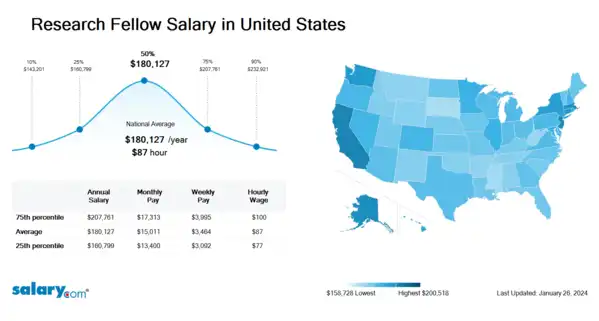

Main navigation
Standard practice guide policies, postdoctoral research fellows.
Since postdoctoral research training is a valuable educational path for scholars in certain academic fields, the University provides opportunities for individuals to be appointed as Research Fellows or Senior Research Fellows while receiving such training. Each Fellow’s hiring unit should assign a tenured or tenure track instructional or research faculty member to provide mentorship to him or her.
Regulations and Definitions
Titles and term of appointments.
- Units at the University will use the title of Research Fellow when appointing individuals who already possess either a terminal doctoral degree (i.e. Ph.D.) or a professional doctorate (e.g., M.D., D.D.S, D.V.M.) and who are pursuing advanced scientific or scholarly training, which may be in a clinical setting but is outside of the traditional clinical service and does not involve direct patient care.
- Units may appoint Fellows as either Research Fellow or Senior Research Fellow, as appropriate to the circumstances. Research fellowships should be for one year or less, with the possibility of renewal in subsequent years, not to exceed a total of five years of postdoctoral training at the University.
- Before extending an appointment offer, the hiring unit must first identify resources to support the appointment for the entire length of the appointment. If circumstances arise that require the hiring unit to terminate a Research Fellow appointment before the specified appointment end date, before notifying the Fellow the hiring unit should first consult with the appropriate Dean or Director and the Office of Academic Human Resources.
- Research Fellows are appointed for the purpose of providing them with advanced training as described above in section II.A.1. At the outset of the appointment, the faculty member who has been assigned as a mentor to the Fellow should communicate the hiring unit’s standards regarding the responsibilities of the individual Research Fellows and the unit’s expectations for how they should progress through their training. Like all members of the University community, it is the responsibility of each Research Fellow to perform all related activities to the best of his or her ability, in a collegial manner and with the highest standards of integrity.
- Typically and under the appointment terms, Research Fellows will receive a salary, regardless of fund source, for the services the unit expects them to perform. The most common arrangement is for the individual’s training to be accomplished through the performance of obligations on a sponsored grant or contract.
- Research Fellows who are paid via a fellowship, regardless of fund source, under which no service to the University is required, are considered ”scholar trainees.” Units appointing “scholar trainees” may charge the cost of their fellowships to training grants, fellowships or various other University funds designated for such purposes. Appointments of such individuals will be at “0%” effort.
- Hiring units will use the title of House Officer for persons with professional doctorates whose training will involve patient care responsibilities, in a manner consistent with provisions of the contract between the University and the House Officers Association.
- Research Fellows whose program of activities will involve classroom teaching as an ”officer of instruction” must hold a separate appointment for this responsibility in a manner consistent with provisions of the contract between the University and the Lecturers’ Employee Organization.
Support of Research Fellows
Hiring units may pay fellowships and/or salaries and associated benefit costs with the type of funds described below:
- Externally funded training grants or fellowships, which may be administered through the University or paid directly by the granting agency to the Fellow.
- Sponsored research projects, when such training is consistent with the terms of the grant or contract.
- University general funds or other funds.
Approval of Research Fellows
- Before a mentor makes any type of commitment to hire a Research Fellow, the appointment must be approved by the Chairperson or the Dean/ Director of the teaching or research unit in which the appointment is to be made. Before approving a Research Fellow appointment, the Dean or Director will assure that the hiring unit has met the terms described below:
- The hiring unit has identified or will be able to identify appropriate fund sources to cover the cost of the Fellow’s fellowship and/or salary and the required University contributions to fringe benefits associated with the fellowship for the entire duration of the appointment.
- The hiring unit is able to make space available, if applicable, for the Fellow’s use.
- The mentor and the Fellow have agreed upon a proposed training program that will enhance the Fellow’s scholarship and ability as a researcher.
- The hiring unit has a conflict resolution process available to the Fellow to raise concerns or problems connected with the fellowship. Unit policies are described at: Dispute Resolution for Postdoctoral Research Fellows
Terms and Benefits of Research Fellow Appointments
All Research Fellows will:
- Be required to enroll themselves and their dependents, as necessary, in the University group health and dental plans using the same rate structure that applies to University staff. The University may waive the requirement to enroll if the Fellow is covered by equivalent insurance, or for religious reasons. If the Fellow fails to enroll within thirty days after appointment, the Fellow will be enrolled as a one-person subscriber.
- Have the opportunity to enroll in the University group life insurance program at the same cost and under the same conditions as University faculty and staff.
- Be covered by the University’s worker’s compensation insurance and, when traveling on University business, by the University’s travel accident insurance.
- Be listed in the appropriate University directories.
- Have access to the University’s libraries on the same basis as research faculty
- Have the opportunity to use recreational facilities and to purchase athletic event tickets and University parking permits under the same conditions and at the same cost as for University faculty and staff.
- Upon certification by the mentor of successful completion of training, the Rackham Graduate School will issue a suitable recognition to the Fellow and will notify the Alumni Records Office for inclusion of the Fellow in its records.
- Annual vacation allowance equivalent to one month in twelve (22 workdays) for fellows appointed in yearlong increments. Fellows who are either part-time (i.e. less than 100% effort) or who are appointed for at least six months but less than one year shall receive a pro-rata vacation allowance. Fellows must take vacation time during the annual appointment period. The University will not provide pay in lieu of time off.
- Time off without loss of pay or stipend for all University holidays observed during the appointment period. If operational exigency requires that time off cannot be granted during the holiday, an equivalent amount of time off should be provided during another period of time.
- Time off without loss of pay or stipend during the University’s Season Days, typically the four (4) work days between the days observed s the Christmas and New Year’s holidays. If operational exigency requires that time off cannot be granted during the season day period, an equivalent amount of time off should be provided during another period of time.
- Up to three weeks per year of paid sick leave, if unable to fulfill responsibilities because of personal sickness, childbirth, or injury. The Fellow may also use the three weeks of paid leave to care for a family member due to personal sickness or injury. If the Fellow is ineligible for paid parental leave (less than six months’ service), the Fellow may also use paid sick leave to bond with his or her newly born, newly adopted or newly fostered child within one year of the child’s birth or arrival in the home.
- Six weeks per event of paid maternity (childbirth) leave for birth mothers for physical recovery immediately following birth, provided that is consistent with the rules of the sponsor.
- Up to six weeks per event of paid parental leave for birth mothers, non-birth parents, adoptive parents to bond with a newborn or newly adopted or newly fostered child, or for legal guardianship of a child. A Fellow will become eligible for paid parental leave following a six-month period of employment as a Research Fellow, starting at the date of the first appointment, provided that it is consistent with the rules of the sponsor. Parental leave is available for use within one year of the event, and may be taken at one time or intermittently, with advanced notice and departmental approval, consistent with the rules of the sponsor.
Up to six (6) weeks per year of paid extended leave, if fellows are unable to fulfill responsibilities because of a qualifying disability, e.g., serious illness or serious injury. A Fellow will become eligible for paid extended leave following a six-month period of employment as a Research Fellow, starting at the date of the first appointment. A Fellow returning from extended leave must remain at work for at least six months to renew the extended leave benefit. Paid extended leave may be utilized in combination with the annual vacation allowance (II.D.8.a.) and/or paid sick and paid maternity (childbirth) leaves (II.D.8.d.)
The following procedure must be followed for a Fellow to be eligible for Paid Extended Leave or Paid Maternity (childbirth) Leave:
The Fellow must report the qualifying illness/injury/childbirth to the University’s Work Connections program which provides confidential management of the event/condition while certifying eligibility to use paid extended leave. The Fellow is required to submit appropriate medical documentation to Work Connections. Work Connections will verify the qualifying medical disability, expected duration of absence and any work restrictions, and inform the hiring unit of the paid extended leave eligibility. Information about Work Connections and the authorization forms are available at: Work Connections .
Note: Appointing units must maintain records related to attendance and usage of vacation, sick leave, paid extended leave, paid maternity (childbirth) leave allocations described in section D. 8.a., d., g., and e. above. No attendance or absence records are maintained for Research Fellows by the Payroll Office or other central units. University costs associated with vacation, sick, paid extended leaves, paid maternity (childbirth) leave, and paid parental leave will be assigned to the account from which the Fellow’s salary is paid provided it is consistent with the rules of the sponsor and other external regulations If the account is insufficient to cover the full cost of benefits, the unit must notify the appropriate fund area of Financial Operations and identify another suitable account to which the benefit costs can be charged.
- Salaried Fellows who meet the eligibility requirements of the Family and Medical Leave Act of 1993 (FMLA) are eligible under the FMLA to be absent from work without pay for up to twelve weeks in their FMLA benefit year for a qualifying event, with continuation of University contributions to insured benefit coverage during the period. Benefits under the FMLA will be administered concurrently with benefits from paid extended leave (8.g.) and paid maternity (childbirth) leave.
Unpaid Leave of Absence
- Research Fellows may be eligible for up to two (2) weeks of unpaid leave depending upon the circumstances. Appointing units should consult with Academic Human Resources prior to granting an unpaid leave of absence for a Research Fellow.
Withholding of Taxes and Reporting of Income
- Federal and State income taxes and FICA taxes will be withheld and a Form W-2 filed with the IRS for Research Fellows as described in section II. A. (5.) above.
- Exception: No Federal, State or FICA taxes will be withheld from payments issued to Fellows who are “scholar trainees” (as described in section II. A. 6.) because such payments are not considered “wages.” It is, however, “income” to the Fellow and may be taxable under Federal and State law.
- Because a Form W-2 will not be issued, fellows may contact the Payroll Office to request a “fellowship letter” that will state the amount of fellowship received. The Fellow may use this letter as documentation when filing annual tax returns.
Given the variety of existing post doctoral programs, there are no uniform search or selection procedures that hiring units must follow prior to appointing an individual in a Research Fellow position. However, hiring units must observe University policies on non-discrimination and make good faith efforts to develop broad and inclusive selection pools when undertaking searches. When a hiring unit wants to move a Research Fellow to a regular faculty or staff appointment, it should follow the customary recruitment policies and procedures described in SPG 201.22 Recruitment and Employment Process (Regular).

Procedures: UHR Procedure for SPG 201.19
This SPG was updated on August 10, 2022 to include a new section (II.E.) on unpaid leave of absence. Other changes include Section II.A.2.: postdoctoral training may not exceed five years at the University ; Section II.C.2.: funding and benefits must be provided for the entire duration of the appointment ; Section II.C.3.: space must be provided if applicable .
RESEARCH FELLOW
How to apply.
Submit the following application materials to Dr. Guizhi Zhu: [email protected]
1. CV
2. A summary of previous research experience
3. A brief statement of future research interests and career goals
4. Contact information for three letters of reference
With the overarching goal to develop novel therapeutics and vaccines, Zhu Lab research interest lies at the interface of RNA/DNA/protein chemistry and engineering, immunology, and applied chemistry and biomaterials. Our current focus is to develop nucleic acid immunotherapeutic/vaccines and their delivery systems, for the prophylaxis and immunotherapy of cancer, infectious diseases, and autoimmune disorders. We have published >100 papers including research articles in Science Advances, Nature Communications, and PNAS. Our research has been supported by >$10 million external funding from National Institutes of Health (NIH), Department of Defense (DoD), American Cancer Society (ACS), among others.
Our lab is a vibrant research community that values intellectual innovation, teamwork, scientific excellence, and career development. As a graduate student or postdoc, you will:
- Work on cutting-edge projects: Tackle challenging scientific questions related to nucleic acid therapeutics and vaccines, and contribute to the development of novel disease treatments and preventive measures.
- Collaborate with experts: Engage in interdisciplinary collaborations within the lab and with leading researchers in the University of Michigan and worldwide. Benefit from the diverse expertise and perspectives to accelerate your scientific growth.
- Access state-of-the-art facilities: Leverage the advanced infrastructure in the lab and institution, including modern laboratories, cutting-edge equipment and expertise, and resources, to conduct your research effectively and efficiently.
- Publish and present your work: Dr. Zhu's lab encourages the dissemination of research findings through high-impact publications and presentations at national and international conferences, ensuring your work reaches a wide audience.
- Lead research projects and work with the team on research projects, train graduate students and undergraduate students, writing manuscripts and assist in writing research proposals, and other duties required for regular lab management and research development
Learn more: https://pharmacy.umich.edu/people/guizhiz or https://guizhizhu.org/
About University of Michigan and Ann Arbor:
The University of Michigan is a leading research institution known for its exceptional academic programs, cutting-edge research facilities, and vibrant campus life. University of Michigan is ranked #33 in QS World University Rankings 2024. University of Michigan School of Pharmacy has long been ranked top 3 in the US.
The city of Ann Arbor, the university's home, offers a welcoming and intellectually stimulating environment. Ann Arbor is the most educated city in the US. Ann Arbor has been ranked a top 1-8 best city for living in the US in the past 5 years. Living in Ann Arbor is featured with great safety.
Required Qualifications*
- Candidates must hold a Ph.D. or equivalent degree in a relevant scientific discipline. Expertise in one or multiple of the following fields are desirable: nucleic acid chemistry/engineering/delivery, immunotherapy or vaccine development, gene editing, drug delivery, or related areas.
- Strong motivation and down-to-earth attitude for scientific innovation and drug/vaccine/technology development.
- Independent analytical and problem-solving skills: Ability to think critically, design experiments, analyze and intemperate data, and troubleshoot experimental challenges.
- Communication and teamwork: Excellent written and verbal communication skills and the ability to work collaboratively in a diverse team environment.
Background Screening
The University of Michigan conducts background checks on all job candidates upon acceptance of a contingent offer and may use a third party administrator to conduct background checks. Background checks are performed in compliance with the Fair Credit Reporting Act.
U-M EEO/AA Statement
The University of Michigan is an equal opportunity/affirmative action employer.
Synonyms for Research fellow
110 other terms for research fellow - words and phrases with similar meaning.
Alternatively

Summer Undergraduate Research Fellowship (SURF)

Each summer, the McDonough Summer Undergraduate Research Fellowship (SURF) offers students the opportunity to apply for a grant to conduct original research of their choice. Those receiving the grant are awarded up to $6,000 for a 12 week research project to be completed during the summer.
Students connect with faculty members to investigate topics that are related to business but may also be interdisciplinary in nature. By working one-on-one with a faculty advisor, students learn how to use the research process to inform a real problem.
Upon completion of the research project, students present their findings in a forum open to the entire Georgetown community and have their research papers, posters, or video presentations published on our website.
Applications for SURF 2024 are now closed. Please review our 2024 SURF information session to learn more about the program, and check back later for updates.
2024 SURF Program
Application Deadline: January 15, 2024
Please contact Dr. Justin Smith , Associate Dean for Strategic Initiatives, with any questions.
Explore our archives of previous SURF projects and posters.
*Please note that the SURF program is only available to current McDonough undergraduate students.
The Inter-American Foundation Research Fellowship Program
Inter-american foundation (iaf).
The Inter-American Foundation (IAF), in conjunction with the Social Science Research Council (SSRC), welcomes applicants for its new Research Fellowship Program to advance rigorous field-based research on actionable questions about community-led development in Latin America and the Caribbean. The IAF will award up to ten fellowships. Each of the ten fellowships includes a stipend of $20,000 to support an individual researcher working over twelve months in one or more of the countries in the region where the IAF works, participation in a three-day in-person orientation workshop, and engagement with the network of IAF Fellows. Applicants must be a citizens of one of the countries in which the IAF works or the United States and must have at least a Bachelor’s Degree.
- Deadline: Dec 03, 2024 (Confirmed)*
- Work Experience: 0-5, 5-10, 10+
- Location: North America, South America
- Citizenship: Any
- Residency: Any
Create an Account / Log In
Please create a free ProFellow account or log in to view listings in our database.
Fellowship Resources
- Calls for Applications
- Upcoming Fellowship Deadlines
- Fellowships Database
- Interviews with Fellows
- International Fellows Network
- Graduate Funding Directory
Fellowship Tips
- What is a Fellowship?
- Fully Funded Course
- Graduate School Funding
- Fellowship Application Tips
- Fulbright Application Tips
- Fellowship Application Guide
- Our Mission, History & Values
- ProFellow Winner Testimonials
- Fully Funded Course Testimonials
- Fellowship Industry Report
- Advertise With Us
- Terms & Privacy
ProFellow is the go-to source for information on professional and academic fellowships, created by fellows for aspiring fellows.
©2011-2024 ProFellow, LLC. All rights reserved.
- GW Hospital
- Ways to Give

Sharad Goyal, MD, MS, Named a Fellow of the American Society for Radiation Oncology
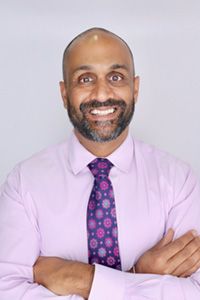
Sharad Goyal, MD, MS , is among 48 American Society for Radiation Oncology (ASTRO) members to receive the 2024 ASTRO Fellow (FASTRO) designation. Since its inception in 2006, the FASTRO designation has been awarded to just 498 of ASTRO’s 10,000 members worldwide. Goyal will be recognized at an awards ceremony on October 1 in Washington, D.C., during ASTRO’s 66th Annual Meeting.
“Dr. Goyal, Professor and Division Director of Radiation Oncology at the GW Cancer Center, joins an elite group of physicians and medical physicists who are recognized this year for their far-reaching contributions to the field of radiation oncology and their progress in advancing cancer research, education, and patient care,” said Jeff M. Michalski, MD, MBA, FASTRO, Chair of the ASTRO Board of Directors. “Congratulations to Dr. Goyal for achieving the designation of ASTRO Fellow.”
Goyal is an internationally recognized radiation oncologist, researcher, and thought leader in breast cancer. His areas of research include improved treatment modalities and the identification of biomarkers in breast cancers. He is the author of more than 140 peer-reviewed publications (h-index 35) and serves on editorial boards and national committees related to imaging, health policy, and guidelines in oncology.
Goyal is a professor in the Department of Radiology, with a secondary appointment in the Department of Neurosurgery, at the George Washington University School of Medicine and Health Sciences. He received his BS (1998) and MD (2002) at the University of Virginia and completed his residency at Rutgers University. Goyal joined the GWU faculty in 2017 from Rutgers University, where he was an Associate Professor & Director of Research in the Department of Radiation Oncology.
Director of the GW Cancer Center, Julie Bauman, MD, MPH, said of Goyal’s accomplishment, “On behalf of the GW Cancer, congratulations to Dr. Goyal for earning this prestigious honor, recognizing him as a national leader in the field of radiation oncology.”
"I am incredibly honored to be named a Fellow of the American Society for Radiation Oncology," said Goyal. "Throughout my life, I have been incredibly fortunate to have wonderful mentors, and I owe this achievement to them. I am grateful for the recognition and support from ASTRO and would like to congratulate my esteemed colleagues who were also recognized with FASTRO designation."
Latest News
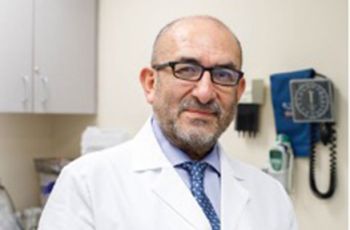
Frist Center for Autism and Innovation

FCAI Welcomes New Fellows and Affiliates!
Posted by stasikjs on Sunday, July 14, 2024 in FCAI News , News .
We are delighted to welcome our new FCAI Fellows and Affiliates for 2024. Read on to learn more about these exceptional individuals.
Rachel Hundley
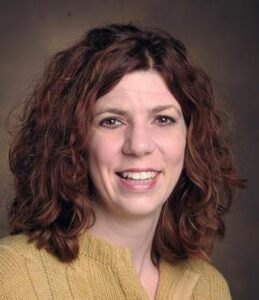
Rachael is a Psychologist and Associate Professor in Pediatrics.
Her clinical and research efforts have focused on assessment for autistic and other neurodiverse individuals. She is particularly interested in developing and providing training initiatives to improve access to care for autistic individuals and their families.
Find out more about Rachel here .
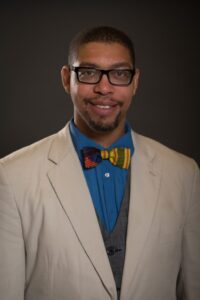
AJ Hinton is an Assistant Professor in the Department of Molecular Physiology and Biophysics at Vanderbilt School of Medicine and Basic Sciences.
Hinton’s lab is a diverse group of scientists using a broad range of tools to explore mechanisms that regulate molecular transfer between and changes in the morphology of the mitochondria and endoplasmic reticulum (ER) and how these mechanisms alter during the pathophysiological states of diabetes, obesity, and cardiovascular disease. Technical approaches employed in the lab target cellular physiology, biophysics, structural biology, molecular pharmacology, and cell signaling, and we translate our research from the bench to the bedside. The Hinton group applies techniques such as primary cell isolation, bioinformatics programming for large data sets, in vitro exercise, confocal/stimulated emission depletion (STED) microscopy, transmission electron microscopy (TEM), 3D electron microscopy, and various types of image analysis. They also use human primary cells, cell lines, and mouse and fly model organisms to delineate pathophysiological states.
Find out more about the Hinton Lab here .
Meghan Burke
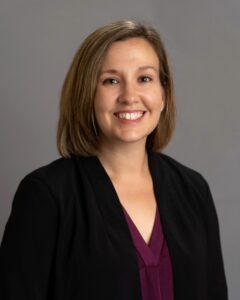
Meghan is a Professor of Special Education at Peabody College of Education.
Dr. Burke’s primary line of research includes developing and testing interventions to improve access to services and, ultimately, functioning among individuals with autism and their families. Most recently, her funded research has focused on measure development and technological tools, which are NICHD and NIMH research priorities. Her work is also grounded in policy; for example, in a funded grant from NIDILRR, Dr. Burke is exploring the effects of Section 504 of the American Rehabilitation Act on individuals with disabilities, including autism. To help conduct her work, Dr. Burke has a strong and diverse research team comprised of individuals with lived experience with disability, including autism.
Read more about Meghan’s work here .
Comments are closed
- MD | PhD Program
- Master's Programs
- PhD Programs
- Postdoctoral Fellows
- Residency & Fellowship
- Non-Degree Programs
- Visiting Students
- Campus Life at U-M
- Health & Wellness
- Building Your Community
- Accessibility & Disability
- Departments
- Centers & Institutes
- Interdisciplinary Programs
- Facts & Figures
- Medical School Leadership
- News & Stories
- Requirements
- Interview Day
- Admissions Chats
- AAMC Michigan's 35 Answers
- AAMC Michigan's 10 Financial Aid Answers
- Admitted Students
- Overview & Highlights
- Patient Interaction
- Chief Concern
- Years 3 & 4
- Learning Informatics
- Training Sites
- Leadership Program
- Global Health & Disparities
- Healthcare Innovation
- Health Policy
- Medical Humanities
- Patient Safety & Quality Improvement
- Scientific Discovery
- Doctoring Course
- Evidence-Based Medicine
- Interprofessional Education
- DEIAJ Curriculum
- Language Opportunities
- Curriculum Diagrams
- Grading & Assessments
- Guideline Budget
- Loans & Eligibility
- Financial Aid Application Timeline
- Scholarships & Grants
- Documents & Forms
- Tips & Links
- Tuition Refund Policies
- Consumer Information
- Disbursement & Repayment
- MD Emergency Student Aid Fund
- MD Travel Grant
- Child Care Subsidy
- Residency Interviewing Loans and Resources
- Short-Term University Loan
- Contact the Office of Financial Aid
- Profiles & Demographics
- Culinary Connections
- Students with Disabilities
- Health & Wellbeing
- Arts & Humanities
- Diversity & Health Equity
- Dual Degrees
- More Possibilities
- Commencement
- Available PhD Programs
- Academic & Social Events
- MSTP Fellows
- Application Process
- Application Requirements
- MD | PhD Curriculum
- Undergrad Summer Program
- Contact the MD | PhD Program
- Bioinformatics
- Biological Chemistry
- Cancer Biology
- Cell & Developmental Biology
- Cellular & Molecular Biology
- Genetics and Genomics
- Health Infrastructures & Learning Systems
- Microbiology & Immunology
- Molecular, Cellular & Developmental Biology
- Molecular & Cellular Pathology
- Molecular & Integrative Physiology
- Neuroscience
- Pharmacology
- Recruitment Events
- Interview Weekends
- Certificates & Dual Degrees
- Quantitative & Computational Biology Emphasis
- Training Grants
- Facilities & Resources
- Stipend & Benefits
- Professional Development
- Finding a Position
- Funding Your Postdoc
- Hiring Process
- Postdoc Preview
- International Postdocs
- ACGME Fellowships
- Non-Accredited Fellowships
- Postdoctoral Physician Scientist Training
- Salary & Benefits
- Prerequisites
- Visiting Residents & Fellows
- Application Overview & Requirements
- Tuition & Fees
- Timeline & Curriculum
- Information Sessions
- Program Details
- Undergrad Summer Research
- First Days Survival Guide
- Health Services
- Mental Health
- Health, Spirituality & Religion Program
- For Partners & Families
- Things to Do in Ann Arbor
- Getting Around
- Graduate Medical Education
- Office of Continuing Medical Education
- Office of Faculty Affairs & Faculty Development
- Office of Graduate & Postdoctoral Studies
- Physician Scientist Education & Training
- Office of Medical Student Education
- Points of Blue
- DEI & Well-Being Initiatives
- Medical Student Program
- Resident Research
- Resident Life
- Categorical Program
- Primary Care Program
- Physician Scientist Training Program
- Ambulatory Care & Primary Care
- Scholarly Activities
- Global Health & Health Disparities
- Recent Graduates
- Fellowships
- Facilities & Spaces
- Exhibiting Opportunities
- Grand Rounds
- Basic & Translational Research
- Clinical Research
- Clinical Experience & Quality
- Faculty Recruitment
- John M. Sheldon Allergy Society
- Patient Care
- Adult Congenital Heart Disease
- Heart Failure & Heart Transplant
- Advanced Imaging
- Interventional Cardiology
- Structural Heart Disease
- Vascular Medicine
- Postdoctoral Cardiovascular Research Training Grant
- Advanced Endoscopy
- NIH T32 Gastroenterology Clinical Research
- Clinical Training
- Transplant Hepatology
- Conferences & Lectures
- Interventional Endoscopy Program
- Academic Primary Care Program
- Geriatric Medicine
- Geriatric-Hospice & Palliative Medicine
- Physician Scientist Training in Age-Related Diseases
- Research Training in Biogerontology Program
- Claude D. Pepper Older Americans Independence Center
- Hospice & Palliative Medicine
- Hospice & Palliative Medicine: Pediatric Track
- Palliative Medicine Research Program
- Training Schedule
- Data & Research
- UNITE Collaboration
- Hospital Medicine Fellowship
- Resident Teaching Services
- Clinical & Research Training
- Curriculum & Tracks
- Curriculum & Training
- Basic Research
- Program for Clinical Research in Diabetes Care & Complications
- Program for Translational Research in Diabetes & Metabolic Diseases
- Interventional Nephrology
- Transplant Nephrology
- Basic Science Research
- Outcomes Research
- Critical Care Medicine
- Research Training
- Pathways & Structure
- Research Opportunities
- Resident & Medical Student Education
- Chronic Obstructive Pulmonary Disease
- Critical Care
- Fibrotic Lung Disease
- Health Services, Outcomes, & Policy Program
- Lung Injury & Repair
- Lung Transplantation & Stem Cell Biology Program
- MICReW Workgroup
- Microbiome Program
- Pulmonary Immunity
- Severe Asthma
- Dual Adult-Pediatric Rheumatology Program
- Lupus Program

Advancing Knowledge
Providing unmatched and enriching educational experiences for the development of all levels of learners.
Education is at the heart of everything we do. Since 1848, the Department of Internal Medicine has led the vision and mission of the U-M Medical School. Our legacy of learners, residents and fellows spans generations and connects us with hospitals and institutions around the world.
In today’s ever-changing healthcare system, a career in medicine demands not only a wide breadth of knowledge and a host of special skills, but the passion and compassion that accompany the highest quality of patient care, education and research. Learn more about how we help each of our learners reach their full professional potential with the educational programs below.
Prepare for a career in internal medicine with inpatient and outpatient rotations in a broad range of subspecialties.
Train in a variety of clinical care sites with a diverse patient population.
Prepare for a career in Internal Medicine and Pediatrics in our program that has pass rates of over 90%
The Department of Internal Medicine is home to over 22 exceptional fellowship and training programs to increase your skills and advance your career.
Every Friday throughout the academic year, the Department of Internal Medicine hosts weekly Grand Rounds to share the latest advances in internal medicine.
Enhance your knowledge, skills and practice with regular opportunities to learn from our expert faculty members. Innovative, unbiased and evidence-based medical education activities are available in-person or virtual via live webinar and on-demand courses.

We transform lives through bold discovery, compassionate care and innovative education.
- Diversity, Equity & Inclusion
- Find a Doctor
- Conditions & Treatments
- Patient & Visitor Guide
- Patient Portal
- Clinical Trials
- Research Labs
- Research Centers
- Cores and Resources
- Programs & Admissions
- Our Community
- Departments, Centers & Offices
- About the Medical School
Global Footer Secondary Navigation

An official website of the United States government
Here’s how you know
Official websites use .gov A .gov website belongs to an official government organization in the United States.
Secure .gov websites use HTTPS A lock ( Lock A locked padlock ) or https:// means you’ve safely connected to the .gov website. Share sensitive information only on official, secure websites.

Associate Fellowship Program
HOME | HOW TO APPLY | CONTACT US
Associate Fellowship Program: 2023-2024 Associate Fellows
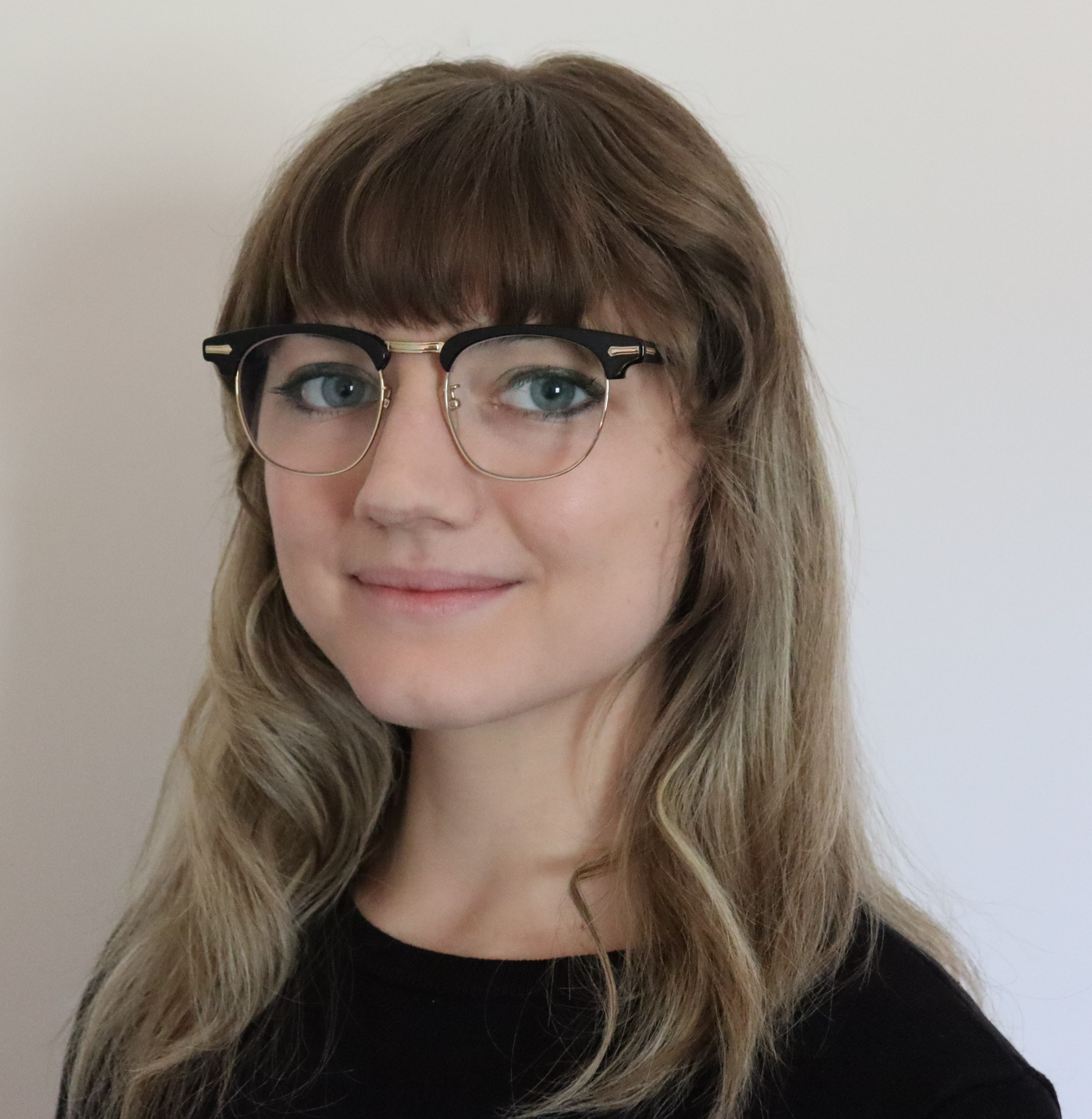
Alex Henigman
Alex Henigman received her MLS from Emporia State University in May 2023. While completing her program, Alex worked and interned at various institutions, including the Zalk Veterinary Medical Library at the University of Missouri, the Network of the National Library of Medicine Region 3, the Open Legal Blog Archive, and the NASA Goddard Space Flight Center Library. She gained experience with reference, open access, and metadata in these roles. Alex has developed research skills as a Medical Library Association Research Training Institute Fellow. She is passionate about health literacy, open science, and food justice. Before graduate school, Alex worked as an Adult Reference Paraprofessional at a public library while she earned her B.A. in English from the University of Missouri – St. Louis. As an NLM Associate Fellow, Alex hopes to gain health literacy, data science, and information dissemination skills, including research data management. Following the fellowship, Alex aspires to work in a research or academic setting, performing work related to health/nutrition literacy, information ethics, and/or data management.
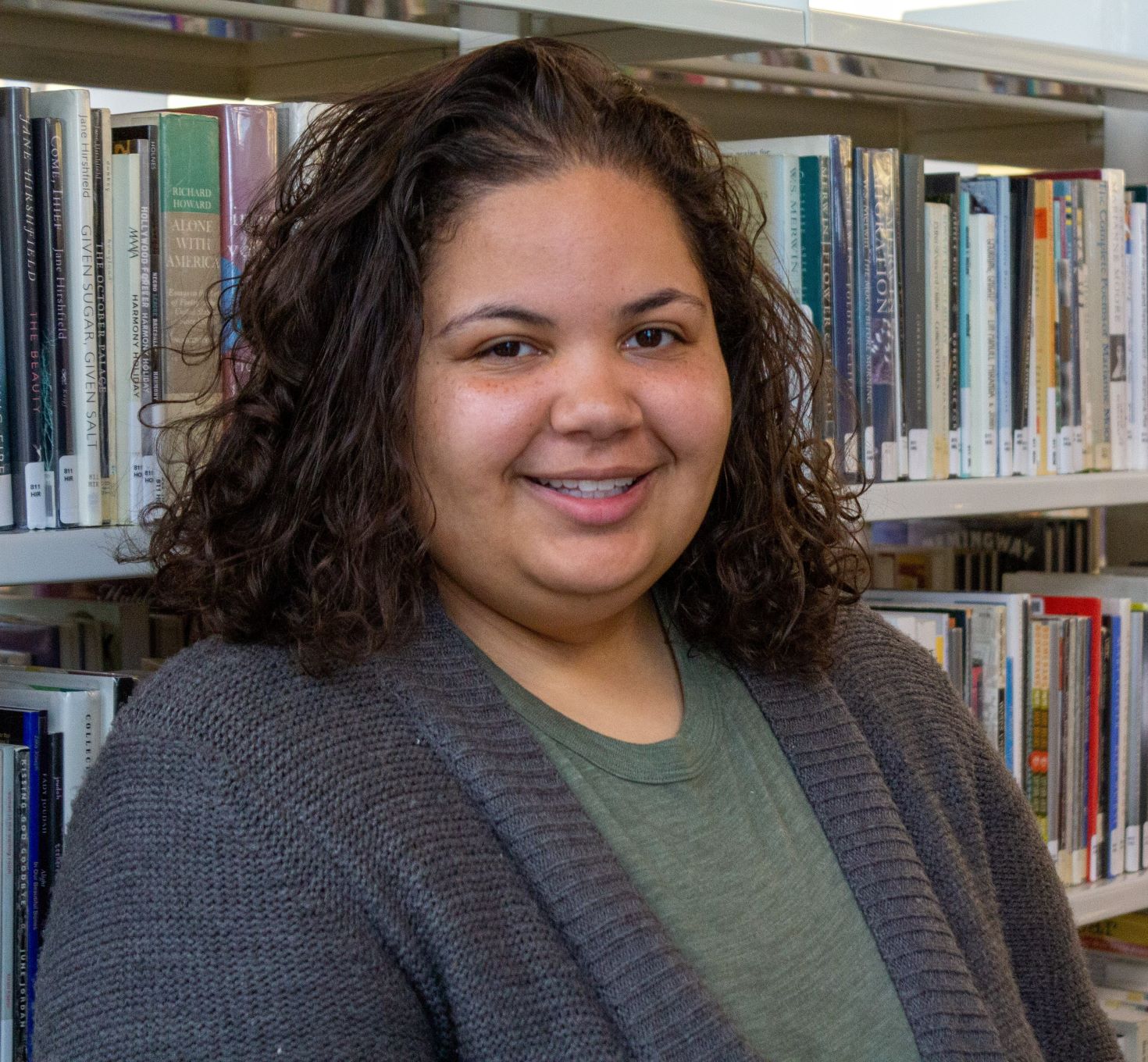
Ariah Long received her MLIS degree from the University of Illinois at Urbana-Champaign in May 2023. During the 2022-2023 academic year, she worked as a graduate assistant at the University of Illinois at Chicago’s Library of the Health Sciences. In this position, she created and edited several supplemental instructional materials related to health sciences research. Moreover, she assisted students and faculty members with academic research queries. Ariah also received her BA in English from the University of Illinois at Chicago, where she worked in the university library’s scholarly communication department and helped develop the library’s makerspace. As an NLM fellow, Ariah is interested in getting involved in the user engagement and training sectors to gain more instructional experience. Additionally, she hopes to gain more data science skills to research health literacy in BIPOC communities. She plans to bring community and comfort to an academic or government library after the fellowship through engagement and training initiatives. Specifically, she hopes to help medical students, researchers, and professionals feel safe, understood, and prepared as they enter their research and professional endeavors.
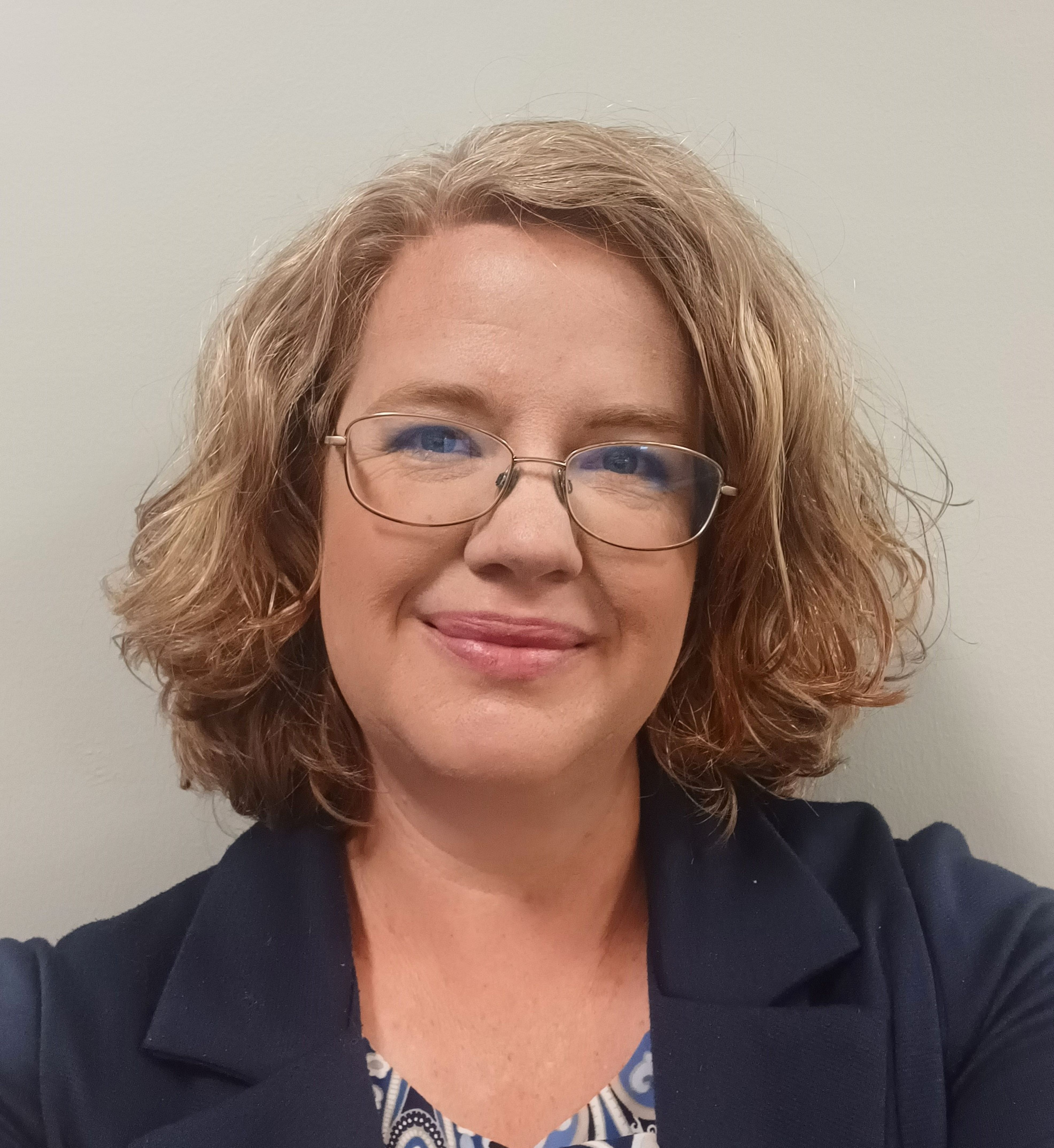
Kristi Torp
Kristi Torp earned her MLS with a Health Information Professionals Concentration from Emporia State University in August 2022. While pursuing her degree, she completed a practicum with NNLM Region 4 and earned her MLA Consumer Health Information and Disaster Information Specializations. Kristi holds a BA in History from Utah Valley University and has previously worked as a piano teacher and at the Springville Public Library. Shortly before finishing her MLS, she began working for NNLM Region 5 at the University of Washington, where she helped create the Diverse Voices in Health and Medicine Collection Development Toolkit. After graduation, Kristi continued working with NNLM Region 5 as a Project Specialist. As an NLM Associate Fellow, she is eager to explore collection development, the history of medicine, and health outreach. After the fellowship, she hopes to work in an academic or government setting where she can promote health equity and health literacy.
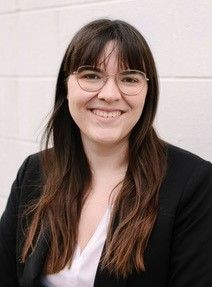
Julie Volpenhein
Julie Volpenhein received her MSLS in May 2023 and her Bachelor of Arts in English in 2020 from the University of Kentucky. During her MSLS program, she completed a practicum with the University of Kentucky Medical Center Library, where she worked on a methodology review of public health literature. Before her graduate school program, Julie worked as an AmeriCorps VISTA at the SOS Foundation, a food access nonprofit organization in South Florida. She focused on nutrition education, health literacy, and program evaluation. Julie has interests in controlled terminologies and vocabularies, open science principles, research data management, and user experiences with library services. As a fellow, Julie hopes to learn more about these topics and how to promote high-quality research through library practices. After completing the fellowship, Julie hopes to work in an academic library supporting researchers in their medical and health science work.
- National Fellowships and Scholar Programs
- Location Location
- Contact Contact
- Colleges and Schools
- National Fellowships News
Three USC graduate students recognized with NIH fellowships
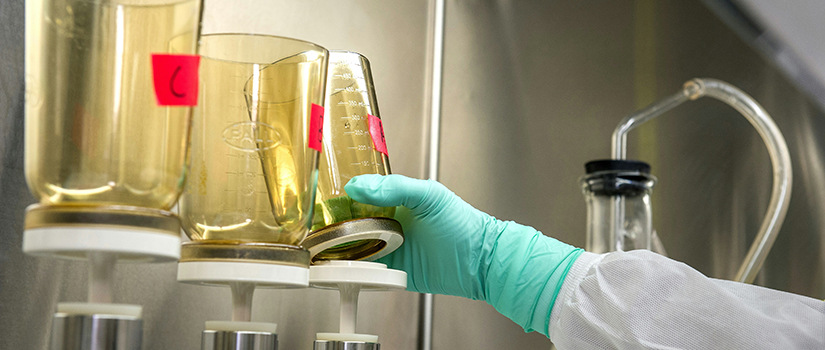
Taylor Berrier, Brooke Bullard and Rachel Hantman are 2024 recipients of the National Institutes of Health F31 Ruth L. Kirschstein Predoctoral Individual National Research Service Awards . As Ph.D. students in communication sciences & disorders, biomedical sciences and clinical-community psychology, respectively, the awardees will receive mentorship and funding for the remainder of their doctoral programs.
Why it matters
The National Institutes of Health F31 Awards grant a $28,224 yearly stipend and can cover 60 percent of tuition costs for up to five years. These fellowships support doctoral students conducting biomedical, behavioral and clinical research by providing funding, training and mentorship. As NIH F31 fellows, recipients conduct cutting-edge medical research projects that have broad impacts in the healthcare field.
Who they are
Taylor Berrier researches in associate professor Suzanne Adlof’s lab at the Arnold School of Public Health. The NIH F31 fellowship will allow her to research the emotion regulation of children with developmental language disorder, comparing the results to those from children with typical development. Her project will study the differences between children’s self-report, behavior and heart rate variability during both a linguistically challenging and a domain-general task. After completing her Ph.D. program, Berrier hopes to be a professor. She plans to study risk and resilience factors for mental health problems in children with language and literacy disorders and train the next generation of speech-language pathologists.
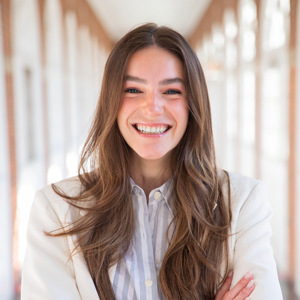
Brooke Bullard is currently researching in professor Angela Murphy’s lab at the USC School of Medicine Columbia. With funding from the NIH, she will research the health benefits of dietary panaxynol, a compound found in American ginseng, on gut resilience in murine models of Ulcerative colitis. This project will study panaxynol-associated changes to immune, microbial, and metabolite profiles, and Bullard aims to develop this compound into a safe and effective treatment for colitis. She aspires to be a professor so that she can help future students pursue their academic goals.
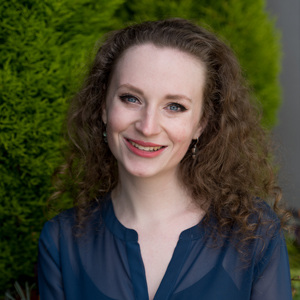
Rachel Hantman conducts research with professor Jane Roberts at USC’s Neurodevelopmental Disorders Lab. As an NIH F31 fellow, she will research infants with fragile X syndrome and those with neurotypical development. She will focus on how mothers’ and children’s respiratory sinus arrhythmia are synchronized, paying special attention to how certain factors such as stress and family relationship quality affect this function. After her doctoral studies, Hantman wants to continue researching biobehavioral interactions and the impact of context in neurodevelopmental disorders. She also plans to work as a clinician, assessing for neurodevelopmental disorders.
In addition to receiving support from national fellowships advisors, applicants can also gain insight from a faculty committee. Members of the 2023 – 2024 NIH committee were David Mott , Fabienne Poulaine , Ronald Prinz and Jeff Twiss .
Students interested in learning more about applying for National Institutes of Health grants should contact USC’s national fellowships team .
Challenge the conventional. Create the exceptional. No Limits.

- Admitted Students
- Current Students
- Field Agency Partners
- Prospective Faculty
BC.EDU LINKS

- Boston College
- Campus Life
- Jesuit, Catholic
- Academic Calendar
- BC Magazine
- Directories
- Offices, Services, Resources
- Agora Portal
- Maps & Directions
- News & Events
Two BCSSW students awarded doctoral fellowships

From left to right: Doctoral students Charles Currie and Sophia Eisenberg
Charles Currie, Ph.D.’25, and Sophia Eisenberg, Ph.D.’27, have received $5,000 fellowships from the Boston College School of Social Work to honor their past achievements and support their future research.
Currie won the Elaine Pinderhughes Fellowship, which is awarded annually to an outstanding Black doctoral student, while Eisenberg won the Carolyn B. Thomas Fellowship, which is given every year to a doctoral student whose scholarship focuses on children and families.
Currie plans to use the funding from his fellowship to support his dissertation, with a particular focus on hiring research assistants and purchasing statistical software to aid his study.
He says his research project will shed light on what life is like for young people in Sierra Leone who have spent time in residential care before leaving and transitioning into independent adulthood.
The study, he says, would mark the first time that any scholar has explored the well-being of so-called “care leavers” in the West African country. And his findings, he adds, could serve as a jumping off point to develop metrics to determine what young people in residential care need to succeed on their own.
“The hope is that this would be a groundbreaking study of care leavers in Sierra Leone,” says Currie, whose fellowship is named in honor of Elaine Pinderhughes , a Professor Emerita who chaired BCSSW’s clinical program. “Hopefully it will lead to more replicable models for preparing young people to leave care.”
His research will build on his three-year stint at The Raining Season , a nonprofit that strives to provide hopeful futures for vulnerable children in Sierra Leone. From 2017 to 2020, Currie developed a program that prepared youth living in a residential care home at the nonprofit to reach their potential.
A few of the young people in the program went on to learn a trade, he says, while many others enrolled in college. One young woman is now in her final year of a bachelor of social work program in the capital city of Sierra Leone.
Currie hopes that some of the youth who participated in the program will be able to contribute to his study, particularly the student studying social work.
“It would be a dream to add a participatory element to my dissertation project and to have her and a few others contribute to the questions that are being asked or to even help analyze the data,” says Currie, who will begin his fourth and final year in the doctoral program this fall. “Ultimately,” he adds, “my aim is to serve those young people and the many others like them around the world in whatever ways I can.”
Eisenberg, a rising second-year doctoral student, is currently working with BCSSW Professor Catherine Taylor , a public health researcher who studies ways to prevent child abuse. In particular, Eisenberg is analyzing quantitative data for a randomized controlled trial focused on implementing parenting interventions to prevent the maltreatment of children.
While her precise plans to use her fellowship money are to be determined, she knows that she wants to continue studying the health and well-being of kids and families. She is particularly interested in working to reduce the rates of violence among youth with disabilities, who are three to four times more likely to experience violence and neglect than other children.
“I really want to look at how parenting buffers the association between community violence, exposure to violence, and neurocognitive outcomes in early childhood,” says Eisenberg, whose fellowship was established in 1989 by Carolyn B. Thomas, a longtime BCSSW professor who chaired the doctoral program.
Eisenberg cultivated her interest in this area of study while working at a public charter school on the South Side of Chicago. As a special education teacher and case manager from 2017 to 2021, Eisenberg designed reading courses, managed a caseload of 30 students a year with Individualized Education Plans, and got a close look at how exposure to gun violence affected the mental health of her pupils.
She followed up her experience at the charter school by working for the Office of the Mayor of Chicago, where she evaluated three violence prevention programs within the city’s Department of Family Support Services. It was then, while she was enrolled in the M.S.W. program at the University of Chicago, that she applied to BCSSW’s doctoral program.
“The violence prevention work I did in Chicago was very much ingrained in public health, and I liked how much public health focus there was among the professors at BCSSW,” says Eisenberg. “Through my work in Chicago, I also realized that I wanted my research to focus more on early childhood even though I had more experience in older adolescents and young adults.”
Both Currie and Eisenberg say that they want to become tenure-track professors, working to train the next generation of social workers to solve some of the world’s most pressing social problems.
Their fellowships, they say, bring them one step closer to achieving their career goals.
“This award is a catalyst for my development as well as for improving the well-being of folks who will be served by my work,” says Currie.
As Eisenberg puts it: “This fellowship solidifies my commitment to working with children and families long term. I think it’s easier to focus solely on children or families, but I hope to continue to look at them in tandem along with other ecological factors that affect health and well-being.”

Two BCSSW students participated in a symposium on forced migration. Their experiences reaffirmed their career paths
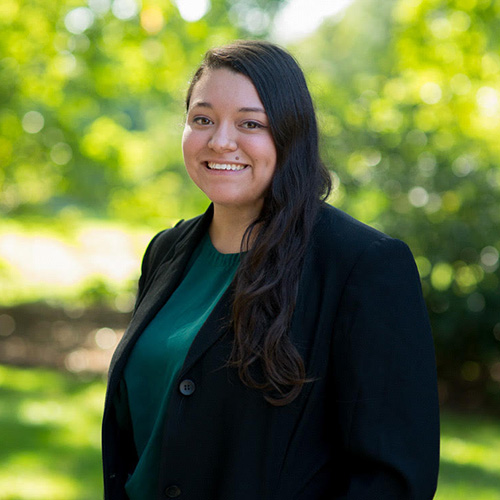
Grand Challenges for Social Work
Research Fellow resume examples for 2024
A research fellow resume should highlight skills in data analysis, cell culture, immunology, and chemistry. These skills are valuable in roles that involve research, data analysis, or program optimization. According to Dr. Alexandra Ormond Ph.D. , Associate Professor of Chemistry at Meredith College, "When I help students revise their resumes, I have them focus on transferable skills that they gained through their experiences. It may not necessarily be what students do that is important to companies, but their learned experience that students can take and apply in their new job."

Research Fellow resume example
How to format your research fellow resume:.
- The job title on your resume should match your application for the role.
- Ensure your work experience focuses on achievements, rather than responsibilities.
- Recruiters and hiring managers suggest fitting your resume on one page.
Choose from 10+ customizable research fellow resume templates
Choose from a variety of easy-to-use research fellow resume templates and get expert advice from Zippia’s AI resume writer along the way. Using pre-approved templates, you can rest assured that the structure and format of your research fellow resume is top notch. Choose a template with the colors, fonts & text sizes that are appropriate for your industry.

Professional research fellow resume example
Resume tips to land the job:.
- If you're choosing between a resume objective or work experience and you want to fit your resume on one page, always choose work experience. However, it's ok for senior level research fellow resumes to be two full pages long.
- Recruiters and hiring managers suggest short, succinct bullet points, instead of long, wordy paragraphs. Make it easy for recruiters to understand your key accomplishments, in 30 seconds.
- As a rule of thumb, lead each bullet point with a verb such "Grew", "Increased", or "Developed".
Research Fellow resume format and sections
1. add contact information to your research fellow resume.
Research Fellow Resume Contact Information Example # 1
Hank Rutherford Hill
St. Arlen, Texas | 333-111-2222 | [email protected]
2. Add relevant education to your research fellow resume
Your resume's education section should include:
- The name of your school
- The date you graduated ( Month, Year or Year are both appropriate)
- The name of your degree
If you graduated more than 15 years ago, you should consider dropping your graduation date to avoid age discrimination.
Optional subsections for your education section include:
- Academic awards (Dean's List, Latin honors, etc. )
- GPA (if you're a recent graduate and your GPA was 3.5+)
- Extra certifications
- Academic projects (thesis, dissertation, etc. )
Other tips to consider when writing your education section include:
- If you're a recent graduate, you might opt to place your education section above your experience section
- The more work experience you get, the shorter your education section should be
- List your education in reverse chronological order, with your most recent and high-ranking degrees first
- If you haven't graduated yet, you can include "Expected graduation date" to the entry for that school
Check More About Research Fellow Education
Research Fellow Resume Relevant Education Example # 1
Doctoral Degree In Chemistry 2014 - 2017
University of California - Davis Davis, CA
Research Fellow Resume Relevant Education Example # 2
Doctoral Degree In Chemistry 2012 - 2015
University of California, Santa Barbara Santa Barbara, CA
3. Next, create a research fellow skills section on your resume
Your resume's skills section should include the most important keywords from the job description, as long as you actually have those skills. If you haven't started your job search yet, you can look over resumes to get an idea of what skills are the most important.
Here are some tips to keep in mind when writing your resume's skills section:
- Include 6-12 skills, in bullet point form
- List mostly hard skills ; soft skills are hard to test
- Emphasize the skills that are most important for the job
Hard skills are generally more important to hiring managers because they relate to on-the-job knowledge and specific experience with a certain technology or process.
Soft skills are also valuable, as they're highly transferable and make you a great person to work alongside, but they're impossible to prove on a resume.
Example of skills to include on an research fellow resume
Immunology is a branch of medical service that deals with studying the immune system of a person. This particular specialization focuses on the function of the immune system and how it affects the entire body. It is usually an activity where it develops a mechanism that helps prevent and susceptibility of bacteria, infection, and other viruses that can enter the body.
Python is a widely-known programming language. It is an object-oriented and all-purpose, coding language that can be used for software development as well as web development.
A Ribonucleic acid (RNA) has a vital role in determining the biological macromolecule commonly found in all bodily cells. It is the synthesis of protein, carriers message instruction from the Deoxyribonucleic acid or DNA. RNA is a kind of single-stranded cell that has different forms. It allows the molecule to go back and forth to its original condition.
Chemistry is the branch of science that tells us about the composition, properties, and structure of elements and compounds. The processes these elements undergo and how they undergo change all come under the branch of chemistry.
NIH stands for the National Institutes of Health. This organization oversees a series of research institutions, each focused on a different area of study involving anatomical systems or diseases. As the organization is affiliated with the government, a great deal of the funding institutions receive come from Congress.
Data collection means to analyze and collect all the necessary information. It helps in carrying out research and in storing important and necessary information. The most important goal of data collection is to gather the information that is rich and accurate for statistical analysis.
C++ is a general-purpose programming language that is used to create high-performing applications. It was invented as an extension to the C language. C++ lets the programmer have a high level of domination over memory and system resources. C++ is an object-oriented language that helps you implement real-time issues based on different data functions
Top Skills for a Research Fellow
- Patients , 9.9%
- Research Projects , 5.6%
- Data Analysis , 5.1%
- Cell Culture , 4.6%
- Other Skills , 74.8%
4. List your research fellow experience
The most important part of any resume for a research fellow is the experience section. Recruiters and hiring managers expect to see your experience listed in reverse chronological order, meaning that you should begin with your most recent experience and then work backwards.
Don't just list your job duties below each job entry. Instead, make sure most of your bullet points discuss impressive achievements from your past positions. Whenever you can, use numbers to contextualize your accomplishments for the hiring manager reading your resume.
It's okay if you can't include exact percentages or dollar figures. There's a big difference even between saying "Managed a team of research fellows" and "Managed a team of 6 research fellows over a 9-month project. "
Most importantly, make sure that the experience you include is relevant to the job you're applying for. Use the job description to ensure that each bullet point on your resume is appropriate and helpful.
- Identified molecular mechanism underlying the therapeutic benefit of MG53-mediated membrane repair.
- Conducted research in the areas of photochemistry, electrochemistry, and polymer science.
- Improved AAV muscle-specific transduction and decreased MG53 liver toxicity by using microRNA (miRNA)- mediated transgene silencing strategy.
- Enabled determination of antibody titers in immunized subjects and linear epitopes involved in protein structure/function by designing diverse ELISAs.
- Investigated ultra-fast spectroscopic study of photophysical processes in dye-sensitized nickel oxide photocathode (collaborated with Papanikolas group at UNC-CH).
- Utilized 3D modeling program K3D and Python software.
- Instructed, evaluated and mentored students in an upper-level Physical Chemistry laboratory course.
- Established self as go-to person for lab support; learned video-editing and supported class University of Maryland Department of website communications.
- Worked on a project to determine the response of prostate cancer cells to phytochemicals.
- Maintained a clean and well-organized chemistry laboratory.
- Entered patient information into database, answered telephones, delivered and received medical charts, made copies, typed letters.
- Trained other research program coordinators.
- Displayed knowledge and compliance with FDA and ICH guidelines and regulations, as well as strict study protocols.
- Developed study protocols, submitted IRB application, created survey instruments, and recruited participants.
- Recruited, screened, and enrolled 600 control subjects and 400 case subjects into a prospective cohort study.
- Collaborated with Dr. P. Andrew Karplus at Oregon State University on several urease X-ray crystal structures.
- Conducted research in the department of Microbiology and Immunology.
- Purified histidine tag protein by affinity and size exclusion chromatography (SEC).
- Developed strong inducible genetic system designed to produce proteins toxic for mosquito larvae.
- Studied urease from Klebsiella aerogenes.
5. Highlight research fellow certifications on your resume
Specific research fellow certifications can be a powerful tool to show employers you've developed the appropriate skills.
If you have any of these certifications, make sure to put them on your research fellow resume:
- Certified Clinical Research Professional (CCRP)
- Clinical Research Assistant
- Professional Researcher Certification (PRC)
6. Finally, add an research fellow resume summary or objective statement
A resume summary statement consists of 1-3 sentences at the top of your research fellow resume that quickly summarizes who you are and what you have to offer. The summary statement should include your job title, years of experience (if it's 3+), and an impressive accomplishment, if you have space for it.
Remember to emphasize skills and experiences that feature in the job description.
Common research fellow resume skills
- Research Projects
- Data Analysis
- Cell Culture
- Cell Biology
- Data Collection
- Public Health
- Flow Cytometry
- Independent Research
- Immunotherapy
- Next-Generation Sequencing
- Animal Models
- Statistical Analysis
- Rna Sequencing
- Molecular Biology Techniques
- Experimental Design
- Research Findings
- Excellent Interpersonal
- Clinical Trials
- Cancer Research
- Gene Expression
- Protein Expression
- Western Blotting
- Molecular Mechanisms
- Scientific Journals
- Animal Handling
- Mass Spectrometry
- Journal Articles
- Research Results
Professional research fellow resume templates

Research Fellow Jobs
Links to help optimize your research fellow resume.
- How To Write A Resume
- List Of Skills For Your Resume
- How To Write A Resume Summary Statement
- Action Words For Your Resume
- How To List References On Your Resume
Research Fellow resume FAQs
How do you list a fellowship on a resume, how do you put a fellowship on a resume, search for research fellow jobs.
Updated June 25, 2024
Editorial Staff
The Zippia Research Team has spent countless hours reviewing resumes, job postings, and government data to determine what goes into getting a job in each phase of life. Professional writers and data scientists comprise the Zippia Research Team.
Research Fellow Related Resumes
- Assistant Research Scientist Resume
- Fellow Resume
- Graduate Research Student Resume
- PHD Researcher Resume
- Research And Development Scientist Resume
- Research Associate Resume
- Research Chemist Resume
- Research Internship Resume
- Research Laboratory Technician Resume
- Research Project Coordinator Resume
- Research Scientist Resume
- Research Specialist Resume
- Research Technician Resume
- Researcher Resume
- Senior Research Associate Resume
Research Fellow Related Careers
- Assistant Research Scientist
- Graduate Research Student
- PHD Researcher
- Postdoctoral Associate
- Postdoctoral Research Associate
- Research And Development Scientist
- Research Associate
- Research Chemist
- Research Internship
- Research Laboratory Technician
- Research Project Coordinator
- Research Scientist
- Research Specialist
- Research Technician
Research Fellow Related Jobs
Research fellow jobs by location.
- Research Fellow Bakersfield
- Research Fellow Bel Air South
- Research Fellow Cary
- Research Fellow Colonie
- Research Fellow Gurnee
- Research Fellow Jacksonville
- Research Fellow Lake Oswego
- Research Fellow Lilburn
- Research Fellow Long Beach
- Research Fellow Lowes Island
- Research Fellow Rancho Cordova
- Research Fellow Scottsdale
- Research Fellow Simi Valley
- Research Fellow Stockton
- Research Fellow Westbrook
- Zippia Careers
- Life, Physical, and Social Science Industry
- Research Fellow
- Research Fellow Resume
Browse life, physical, and social science jobs

IMAGES
VIDEO
COMMENTS
A research fellow is an academic research position at a university or a similar research institution, usually for academic staff or faculty members. A research fellow may act either as an independent investigator or under the supervision of a principal investigator. Although research fellow positions vary in different countries and academic ...
A Research Fellow is a U.S. citizen, U.S. permanent resident (green card, resident alien), or non-resident alien with a valid employment-authorized visa foreign national, who has been appointed to conduct health-related research at a NIH facility. Research Fellow (Visiting Program [VP]) appointments may be renewed; however, the total length of ...
Research fellows perform academic research at an educational institution, often while working towards earning an advanced degree. Their work is usually supported for a specified period of time by a grant, endowment, or other dedicated source of funding. They are often researching innovative and cutting-edge technologies or concepts, or ...
To become a research fellow, one typically needs a doctorate in a relevant discipline and a history of publishing peer-reviewed papers. They may work independently or under the supervision of a principal investigator. Relevant skills often include molecular biology, data analysis, cell culture, and research project management.
A research fellow is an academic researcher who conducts research and analysis of comprehensive literature, data, and results and provides literature reviews. He/She supervises research assistants and recruits study participants to interview them for a particular study. To become a research fellow, a candidate should have a doctorate in a ...
Behavioral Research Fellows. As part of the Kellogg Research Support team, Behavioral Research Fellows work with many different Kellogg researchers on a broad set of experimental studies. These researchers tend to come from Kellogg's Management and Organizations and Marketing departments. In addition to running studies in one of our Behavioral ...
Latest Research Fellow jobs on SEEK. Be one of the first to discover these recently listed jobs, or browse all Research Fellow jobs on SEEK right now. Location. Research Fellow. Curtin University. Bentley, Perth WA. Full Time. Education & Training. 3h ago.
Develop a Job description. Pay Equity. Also referred to as: Senior Research Fellow. Requirements and Responsibilities. Research Fellow develops the strategy and vision to position a project from inception through completion; creates teams and collaborations that understand the project's direction. Communicates direction through words or actions ...
To be a Research Fellow typically requires 5+ years of managerial experience. Deep knowledge of the managed sub-function and solid knowledge of the overall departmental function. People's Opinions on Research Fellow responsibilities. A research fellow is an academic research position at a university or a similar research institution, usually ...
Fellows Database. The first Sloan Research Fellowships were awarded in 1955. Since that time, more than five thousand outstanding early-career researchers have received the award. Originally awarded in physics, chemistry, and mathematics, the Sloan Research Fellowships have expanded over the decades to include the support of early-career ...
A research fellow and a research associate are both responsible for conducting research and designing testing procedures to obtain accurate results. However, a research fellow often works on a project-by-project basis under the supervision of a senior scholar, and the projects are funded by a federal or private research grant or endowment. ...
A fellowship can help you pay for graduate or postgraduate education. What a Fellowship Is and Why It Matters. Fellows are selected based on their potential to make a positive, long-lasting ...
2024 Sloan Research Fellows Congratulations to the Sloan Research Fellows of 2024. The following 126 early-career scholars represent the most promising scientific researchers working today. Their achievements and potential place them among the next generation of scientific leaders in the U.S. and Canada. Winners receive $75,000, which may be ...
A Research Associate is a budgeted position with a formal job description that is perpetual in an academic institution. A Research Fellow, on the other hand, is a limited-term appointment that is ...
The average Research Fellow salary in the United States is $181,855 as of June 27, 2024, but the range typically falls between $162,345 and $209,759. Salary ranges can vary widely depending on many important factors, including education, certifications, additional skills, the number of years you have spent in your profession.
Units may appoint Fellows as either Research Fellow or Senior Research Fellow, as appropriate to the circumstances. Research fellowships should be for one year or less, with the possibility of renewal in subsequent years, not to exceed a total of five years of postdoctoral training at the University. Before extending an appointment offer, the ...
The differences between research fellows and scientists can be seen in a few details. Each job has different responsibilities and duties. It typically takes 2-4 years to become both a research fellow and a scientist. Additionally, a scientist has an average salary of $97,344, which is higher than the $53,823 average annual salary of a research ...
Our lab is a vibrant research community that values intellectual innovation, teamwork, scientific excellence, and career development. As a graduate student or postdoc, you will: Work on cutting-edge projects: Tackle challenging scientific questions related to nucleic acid therapeutics and vaccines, and contribute to the development of novel ...
Another way to say Research Fellow? Synonyms for Research Fellow (other words and phrases for Research Fellow). Synonyms for Research fellow. 110 other terms for research fellow- words and phrases with similar meaning. Lists. synonyms. antonyms. definitions. sentences. thesaurus. words. phrases. Parts of speech. nouns. suggest new.
Each summer, the McDonough Summer Undergraduate Research Fellowship (SURF) offers students the opportunity to apply for a grant to conduct original research of their choice. Those receiving the grant are awarded up to $6,000 for a 12 week research project to be completed during the summer.
The Inter-American Foundation (IAF), in conjunction with the Social Science Research Council (SSRC), welcomes applicants for its new Research Fellowship Program to advance rigorous field-based research on actionable questions about community-led development in Latin America and the Caribbean. The IAF will award up to ten fellowships.
Sharad Goyal, MD, MS, is among 48 American Society for Radiation Oncology (ASTRO) members to receive the 2024 ASTRO Fellow (FASTRO) designation.Since its inception in 2006, the FASTRO designation has been awarded to just 498 of ASTRO's 10,000 members worldwide. Goyal will be recognized at an awards ceremony on October 1 in Washington, D.C., during ASTRO's 66th Annual Meeting.
It typically takes 2-4 years to become both a senior scientist and a research fellow. Additionally, a senior scientist has an average salary of $106,672, which is higher than the $53,823 average annual salary of a research fellow. The top three skills for a senior scientist include patients, data analysis and molecular biology.
We are delighted to welcome our new FCAI Fellows and Affiliates for 2024. Read on to learn more about these exceptional individuals. Rachel Hundley Rachael is a Psychologist and Associate Professor in Pediatrics. Her clinical and research efforts have focused on assessment for autistic and other neurodiverse individuals. She is particularly interested in developing and...
Our legacy of learners, residents and fellows spans generations and connects us with hospitals and institutions around the world. In today's ever-changing healthcare system, a career in medicine demands not only a wide breadth of knowledge and a host of special skills, but the passion and compassion that accompany the highest quality of ...
Alex has developed research skills as a Medical Library Association Research Training Institute Fellow. She is passionate about health literacy, open science, and food justice. Before graduate school, Alex worked as an Adult Reference Paraprofessional at a public library while she earned her B.A. in English from the University of Missouri ...
Taylor Berrier, Brooke Bullard and Rachel Hantman are 2024 recipients of the National Institutes of Health F31 Ruth L. Kirschstein Predoctoral Individual National Research Service Awards.As Ph.D. students in communication sciences & disorders, biomedical sciences and clinical-community psychology, respectively, the awardees will receive mentorship and funding for the remainder of their ...
Additionally, a research associate has an average salary of $60,166, which is higher than the $53,823 average annual salary of a research fellow. The top three skills for a research associate include patients, research projects and data analysis. The most important skills for a research fellow are patients, research projects, and data analysis.
Charles Currie, Ph.D.'25, and Sophia Eisenberg, Ph.D.'27, have received $5,000 fellowships from the Boston College School of Social Work to honor their past achievements and support their future research.. Currie won the Elaine Pinderhughes Fellowship, which is awarded annually to an outstanding Black doctoral student, while Eisenberg won the Carolyn B. Thomas Fellowship, which is given ...
A research fellow resume should highlight skills in data analysis, cell culture, immunology, and chemistry. These skills are valuable in roles that involve research, data analysis, or program optimization. According to Dr. Alexandra Ormond Ph.D., Associate Professor of Chemistry at Meredith College, "When I help students revise their resumes, I ...